Easter 2015: How the holiday is celebrated around the world

With Easter just around the corner, celebrations are getting under way with millions of people travelling to see family and friends to share meals and give chocolate Easter eggs. From candlelit processions to Scandinavian crime novels, IBTimes UK looks at how the world celebrates Holy Week ahead of Easter Sunday.
Portugal
Dressed in traditional costumes, local people take part in rituals, processions and chants recreating events related to Jesus Christ's life. Easter week is celebrated at many places across the Iberia Peninsula, with members of the Misericordia brotherhood take part in a procession to collect donations of food and money as they offer bread to widows and widowers ahead of Good Friday.
Norway
Norwegians have a tradition of "Easter-Crime" literature, or Påskekrim, during which many around the country read detective novels. In February 1923, two Norwegians called Nordahl Grieg and Nils Lie decided to write a book about the looting of a train to Bergen, called Bergenstoget plyndret i natt, or simply, The Bergen Train Robbed Last Night.
To promote the book, the authors advertised it by printing its title on the front page of the national newspaper Aftenposten – convincing thousands it was real news. The stunt kicked off what would continue to be Påskekrim.

Spain
Holy Week is Seville is known as Semana Santa de Sevilla and is one of the most spectacular processions of masked penitents and intricate floats. It is one of the city's two largest annual festivals, the other being the Feria de Abril. The festival features a procession of pasos, floats of wooden sculptures depicting scene of the events of the Passion, or images of the grieving Virgin Mary. Many of the sculptures are considered artistic masterpieces, as well as being spiritually significant to the local Catholic population.
Sardinia
During Easter week, Sardinia's capital Cagliari hosts rituals and processions to celebrate the religious festival, which begin on the Friday before Palm Sunday when the sacred Procession of the Mysteries, organised by the Brotherhood of the Crocifisso, leaves from San Giacomo Square. The procession of the Seven Statues of "The Mysteries", dating back to the 18<sup>th century, goes around Cagliari and stops at seven different churches.
Philippines
Catholic Filipinos take part in a ritual in which semi-naked penitent whips their backs with bamboo sticks and blades, as part of religious penance during the week leading up to Easter, including walking barefoot in the heat, to cleanse the sins of devotees.

Poland
Easter in Poland, and many other eastern European countries, is a major holiday in which traditions and rituals are carried out the week before. Śmigus-Dyngus, or lany poniedziałek – "Wet Monday" – is a tradition in which boys drench each other with buckets of water on Easter Monday, the origins of which come from the baptism of Poland's Prince Mieszko on the day in 966AD. Pisanki, handcrafted and painted wooden eggs, are displayed to represent fertility and spring.
Guatemala
Antigua Guatemala, a city in the central highlands of Guatemala, is home to the largest Easter celebration in the world in which the Passion, the Crucifix and the Resurrection of Jesus are commemorated. The procession is rooted in Andalusian tradition and was brought over by Spanish missionaries in the 16th century. The entire city takes part in the event, accompanied by thousands of tourists who travel to the city to experience Holy Week.
© Copyright IBTimes 2024. All rights reserved.





